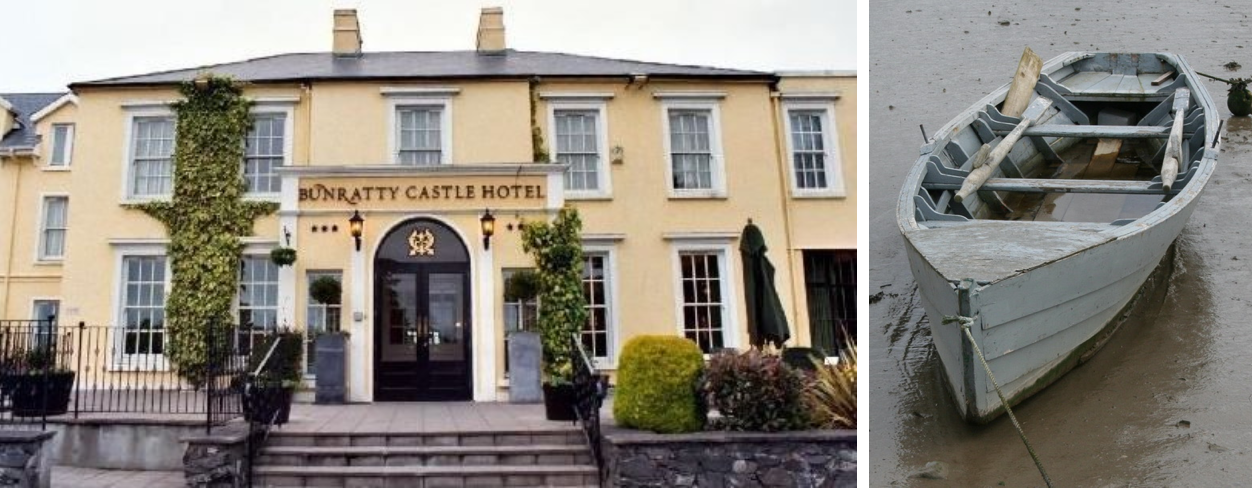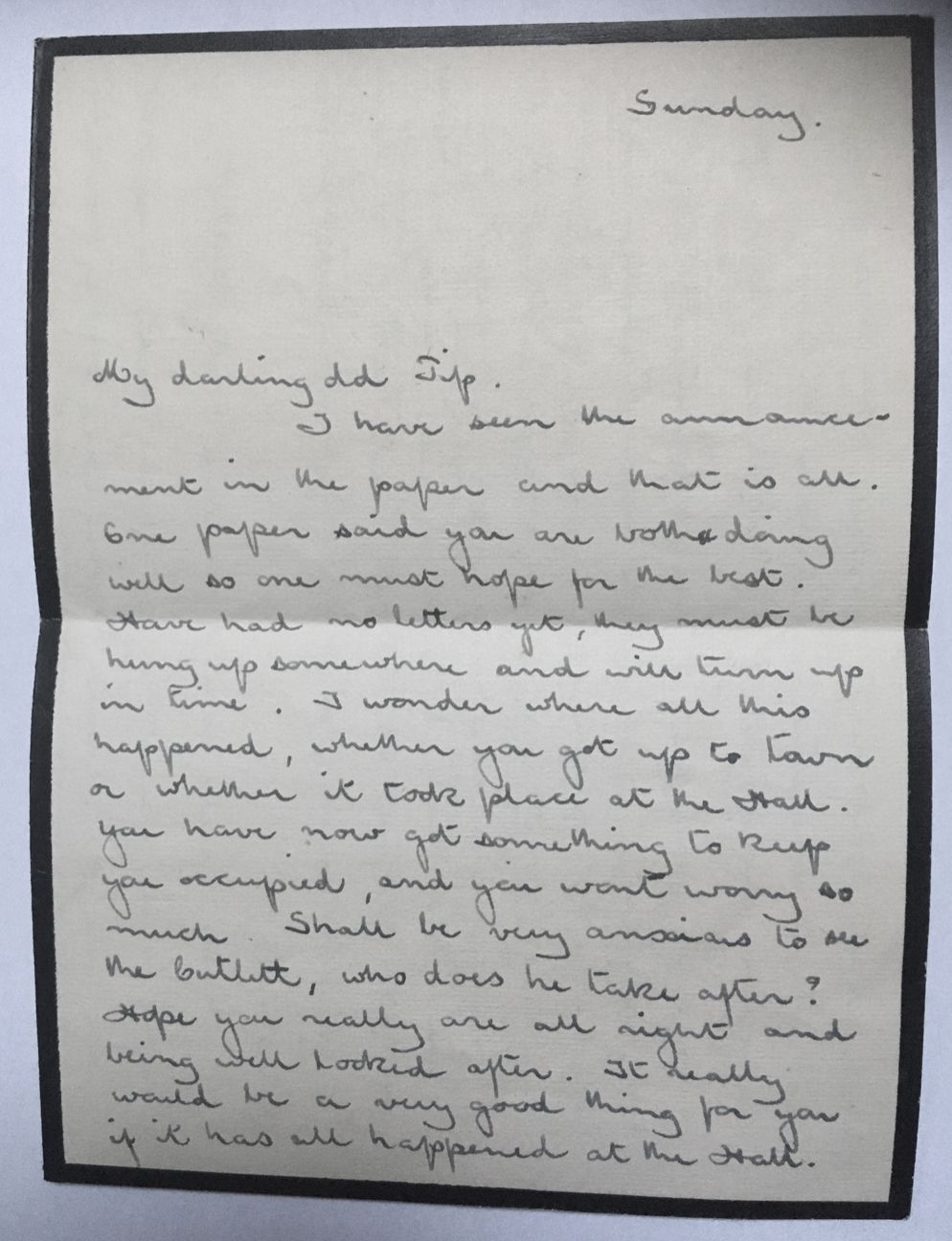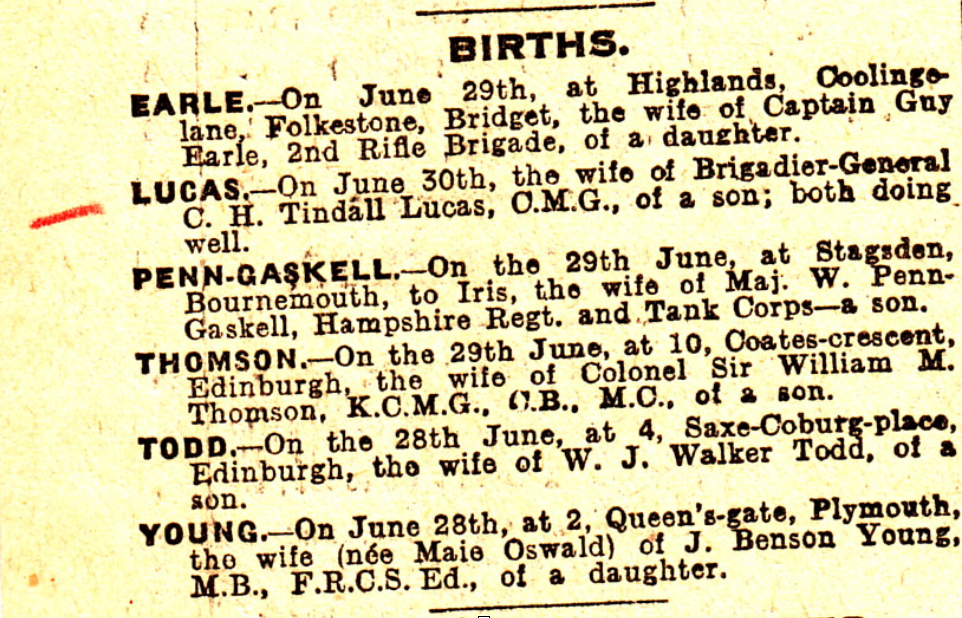4th July - Fifth Letter to Poppy

Secret diary: Sun To Corbetts by boat , dangerous Wire from Pip
Official diary (4th July): I moved by boat to BUNRATTY HOUSE where Mr Corbett lives while here a man named “Sean” (one of my escort) was fooling about with a revolver and accidentally shot himself in the leg, This occurred on the 5th.
Location: Bunratty House
My darling old Pip.
I have seen the announcement in the paper and that is all. One paper said you are both doing well so one must hope for the best. Have had no letters yet, they must be hung up somewhere and will turn up in time. I wonder where all this happened, whether you got up to town or whether it took place at the Hall. You have now got something to keep you occupied, and you wont worry so much. Shall be very anxious to see the Cutlett, who does he take after? Hope you really are all right and being well looked after. It really would be a good thing for you if it has all happened at the Hall. I know Mother would prefer it under the altered circumstances.
I am very comfortable, a good bed, lots of excellent food, and everyone very kind. They couldn’t do more for me than they are. I must be an awful nuisance to them all. I only wish that something would soon be settled about me. I wish I could tell you about my doings, because then you would be quite happy in your mind. How are all the others at home? I expect Father has been to see Percy and so knows more about my prospects than I do. I haven’t heard a word. You have probably had hundreds of letters by now; it will be amusing to read them afterwards. One loses all count of the days when [one] has no work to do.
Was your doctor a fool, or was the whole thing brought on prematurely by this trouble. What about Godparents, Archie, Toby and Peggy, or who? Name suggested is Arthur William, to be commonly called Atty? This black edged paper is the only available at the moment, so don’t let that excite you. Got the Times yesterday, and looked in the personal column to see if there was any news about you, by any chance. The first announcement was headed POP. but didn’t refer to you. Don’t think it is much use using the Times for that purpose as I may not see it regularly. Anyhow when I do get it I shall look out for anything.
Take great care of yourself and Cutlett, hope to see you both in a very short time now with luck; it cant be very long before something is fixed up about me.
your C
When you write address letters to J.S. Kingard c/o Post Office Limerick and not to Brigade Hd qs, as those letters are not coming. You must keep this address to yourself and one member of the family, who will always post the letters. It must be kept absolutely secret, and the letters put in the box at the post office and not in an letter bag.
Fifth letter sent to Mrs C.H. Tindall Lucas, The Hall, Welwyn, Herts England then redirected to No1 Cleveland Gardens, Hyde Park London W.2. Postmark unclear but dated 11pm 4th July. Second postmark Welwyn 2:45 pm 6 July. Letter is rimmed with black.

Poor Poppy, after all she'd been through with the sudden banishment to London, the shock of discovering her husband a prisoner and then the trauma and worry of going into premature labour, she was faced with receiving a letter rimmed in black. This was the stationery commonly used to announce a bereavement. The terror that must have gripped her as she opened the letter would have been enormous. She could well have feared the worse and expected to read the last letter before execution. What a huge relief it must have been to read CHTL's cheery missive.
It’s extraordinary that CHTL writes: "I am very comfortable, a good bed, lots of excellent food, and everyone very kind. They couldn’t do more for me than they are. I must be an awful nuisance to them all". This reads more like a house guest that has had to stay longer than arranged, and who feels awkward because he is imposing on the kindness of his hosts, rather than a captive general in danger of being shot! I’m sure that his various ‘hosts’ appreciated his appreciation of all that they were doing for him. If you had to take in an unwanted ‘guest’ at very short notice, this kindly, well mannered gentleman wouldn’t be the worst person to have in your home.
CHTL enjoying 'lots of excellent food' was probably thanks to a Miss Mulqueen who had worked as a cook in one of the grand houses around Castleconnell. She was recruited to ensure that 'the general was fed in the manner to which he was accustomed'. (p367 The War of Independence in Limerick, Thomas Toomey)
The general no doubt delighted Miss Mulqueen by complimenting her on her fine cuisine and so spurred the lady on to conjure up more delicious dishes to please her distinguished diner. There was no way that CHTL would have contemplated going on a hunger strike when there was such fine food on offer!
Letters
There was good news: Michael Brennan, taking pity on his captive’s young wife, had arranged a system where Poppy would address her letters to a ‘J.S. Kingard’. These would be held back by IRA sympathisers working in the Limerick post office and then collected by a volunteer and delivered to CHTL in whichever abode he was in at the time. CHTL must have doubted that this would work, but was eager to give it a try as he was desperate to hear from Poppy that she and their son were well.
I was very sorry for him and more so for his young wife in England, who was very ill partly after a baby, but mostly, I imagine, from shock. Through Jack Coughlan, who worked in Limerick Post Office, I arranged a system whereby Lucas wrote to his wife and got a letter from her every day. I put him on his honour that he would make no use of this facility to harm us or to escape and I gave him his letters unopened. He could understand been able to send letters, but receiving them impressed him very much with the machine we appeared to control.
BUREAU OF MILITARY HISTORY, 1913-21 STATEMENT BY WITNESS DOCUMENT NO. W.S.1,068 Witness Lieut.-Gen. Michael Brennan, Brigade Adjutant East Clare Brigade
Jack Hogan, whose father was Tom Hogan who hid CHTL in his home in Moyhill recounted:
"hearing how the exchange of letters between the General and his wife was organised. Tom Hogan’s sister was married to Jack Coughlan who worked in the General Post Office in Limerick. He intercepted the letters from the General‘s wife, which were addressed using a pre-arranged pseudonym. Coughlan also organised ‘borrowing’ the postal stamp some Kilmallock post office to stamp the outgoing mail to throw the British off the trail in case it was intercepted by them."
Hastings farmhouse conservation project by Olive Carey The Other Clare volume 37
The use of the Kilmallock stamp is interesting. The letters to Poppy were mainly postmarked ‘Eastbourne’. There were two sent from Dublin and one from Brandon, County Cork the Eastbourne letters must have been sent in another envelope to a contact in the town who then posted them on to Poppy. Perhaps the Kilmallock stamp was used on the outer envelope when it was sent to the Eastbourne contact? However it was managed, the posting of CHTL’s letters was quite an impressive show of IRA contacts and resources.
CHTL had finally received the news that he was now a father. He had been provided with the London Times when ever possible. This was no mean feat for his captors as purchasing a copy of an English newspaper on a regular basis might well have aroused suspicions. The newspaper would have been stocked in the towns as it wouldn't have commanded a wide readership in rural areas.

The brief details in the Birth Announcement aroused some anxiety in CHTL: he had no idea whether Poppy and Cutlett were really well. He was surprised at the premature arrival of his son, Poppy's original dates had indicated that she had a few more weeks to go.
Touchingly CHTL wanted to name Cutlett after Atty, his friend and Poppy's adored brother, whose untimely death at the Somme had brought them together.
As for the godparents: Archie was CHTL’s oldest brother, Toby was Poppy’s surviving brother and Peggy was one of CHTL’s sister, who as a nurse served in France and was currently fielding off the press at their parents’ home in Welling.
With CHTL's father and indomitable sister Peggy keeping the press hounds at bay, at least Poppy was protected from that worry. As CHTL predicted, Percy did get in touch, but Poppy had to wait a few more days.
Moving the General
Volunteers David Moloney and Ned Enright from Limerick helped transport CHTL across the Shannon:
General Lucas was being brought a prisoner across to Clare under escort, the Company provided security patrols and scouts as far as the river and had a boat ready for the crossing.
BUREAU OF MILITARY HISTORY, 1913-21. STATEMENT BY WITNESS DOCUMENT NO. W.S. 823 Witness (a) David Moloney, Castletown, Pallaskenry, Co. Limerick. (b) Ned Enright, Pallaskenry, Co. Limerick.
Once again the Sinn Feiners demonstrated their wealth of resources and the efficient of their units in conveying their prisoner around, often at short notice and during the wee small hours under cover of darkness. There would have been the tension of the dangerous situation, if the party had been discovered it would not just have been the Irish who would have been in danger - CHTL's life may well have been lost as collateral damage.
CHTL enjoyed the thrill of the adventure, danger was not something he wasn't used to, he had to keep his wits about him on these trips, keeping as sharp an eye and ear open as any of his escort. He knew that when the chips were down, it wouldn't be saving his life that would be upper most on his guards' minds.
Volunteer Thomas Wallace was also involved in handing CHTL over to the East Clare brigade:
I recollect that after the capture of General Lucas near Fermoy, he was brought under escort into Templegalantine to Sheehan’s house and was kept there a couple of days and then move to Michael Dore’s at Ballisten, Shanagolden. He was kept a few more days there and we bought in on then to Washpool and across the Shannon to Corbetts’ of Bunratty Castle. We handed him over to the East Clare men there.
CHTL was now dumped in the hands of Michael Brennan, the tough leader of the East Clare Brigade. Brennan had been involved with looking after CHTL but until this point had not had total responsibility for him. Brennan was not too happy about being the keeper of the general - a job he’d only agreed to do for a couple of days:
Early in July Seán Finn and some of his men crossed the Shannon near Bunratty and handed over Lucas to me for “safekeeping“. This was a frightful imposition, but they promised it was only for a few days, so I couldn’t refuse. We kept Lucas for some weeks in Cratloe (at Ernest Corbett’s) in Clonmoney (at Brennan’s), at Tullyvarriga (now the Shannon Airport), at Hastings’ and in Doonass at Hartigan’s.
Thomas Wallace during his time guarding the IRA’s high-profile captive, had developed a liking for CHTL:
I found him a very decent man, a real military man. He discussed matters with us and would hold his point in an argument. We had a few good singers in our crowd and they used to entertain him during his stay with us.
Once more a relationship was formed between men on opposing sides. CHTL would speak his mind, but in a way that earned him respect. His enjoyment of good entertainment meant that he made another connection with the Irish through their music.During WW1 CHTL had served alongside Irish troops in the 29th Division as a Royal Dublin Fusiliers Battalion was part of 86th Brigade and the Royal Inniskilling Fusiliers were led by CHTL in the 87th Brigade. CHTL would have remembered the ‘Old Dubs’ marching into battle singing Republican songs and told the story to his captors. He was involved in helping to organise performances to entertain the troops, which undoubtedly the talents of the Irish troops would have contributed to.
Wallace continued in his IRA witness statement, to record more of the generals virtues:
When he was getting into the boat at Mellon Point to cross the Shannon, he thanked us for our treatment of him and, said if he ever got into power again and any of us happened to be prisoners, he will do his best if he knew of it to say we got a fair deal, though he could not guarantee we will be treated as well as we treated him.
BUREAU OF MILITARY HISTORY, 1913-21 STATEMENT BY WITNESS DOCUMENT NO. W.S. 852 witness Thomas Wallace, Lieutenant Pallaskenry County Limerick Irish Volunteers, Member of A.S.U.West Limerick Brigade.
CHTL would have been as good as his word, he spoke out to make clear that he'd been treated well and this helped IRA men like Sean Moylan avoid the death penalty as CHTL's words gave a good character reference that it was hard to ignore. He would do all he could do in his power to help but he was realistic, he knew that his power would be very limited. He was also aware that his own side did not treat their prisoners with the humanity that he had been shown.
Shooting in the foot
Apparently, according to a relative of Hogan's it was Paddy Hogan who was the 'Sean' who shot himself in the foot. Michaél Brennan had 'a lovely small revolver and during a meeting he had it left up on the table. The next thing was Paddy Hogan got a chance and he stole it. And Michaél picked up another revolver and they had a shooting match between the two of them. Anyway, Paddy Hogan had to give back the revolver but it was during that episode that he was shot in the foot'.
This was a 'dangerous' situation. CHTL had enormous experience of men under intense pressure loosing control with guns. In the trenches he had seen men snap and had sat on many a Court Martial panel. Paddy Hogan was challenging Michaél Brennan's authority. Indiscipline was a danger not only to the IRA, but also to their prisoner. The accidental shooting in the foot during the tussle for the gun could well have resulted in something far more serious and CHTL was relieved that it just ended with a wake up call for Hogan, who had some time in recovery and a lasting scar to make him rapidly 'grow up'. It also gave Michaél Brennan the chance to reinforce his authority, the other lads had witnessed Paddy's tom-foolery and the consequences, they may have been amused by it at first, but the cold reality of a stray bullet, luckily missing a vital organ, may have pulled them up short too.
These were men who, according to their relatives:
"...had no regard for life that they got kind of toughened. In Moyhill, that time, they milked the cows by hand that time and they brought in the milk for the day, mostly it would be in a big white enamel bucket and left up on the table, milk for the house for the day. This night anyway someone brought in the milk and left it on the floor and the cat jumped up on the bucket and Paddy Brennan, a brother of Micháel’s took out his revolver and shot the cat. And, you know normally you’d get the brush and shoo the cat away but they could use the revolvers at the drop of a hat.
It’s a different world that we’re just not clued into anymore. But for all that, they could have shot General Lucas but they didn’t. They seem to have regarded him very highly. He was too much of a gentleman to shoot him you see."
Jack and Nuala Hogan, The Shannon Social History Project
The men holding the general were highly charged on adrenalin: they were living a strange life alternating between the excitement and danger of raids to returning to the every day chores at home.'Nature has created the adrenaline so that we can be our best within a split second, that we can have our guard up and make the right decisions for our survival. Adrenaline is important for survival in a war zone. Many Soldiers feel that the life they are supposed to live when they come home feels rather irrelevant and boring. The decisions are banal, and the adrenaline that they are so used to, can’t be used in every day life. Many soldiers therefore recreate situations that require this rush.' Source
Fortunately CHTL understood this, his need for adrenaline had been partly satisfied by sport, hunting and chasing the big fish on the Shannon. He knew that he needed his wits about him and that his guards needed careful handling. Trigger-happy young men who would automatically shoot a cat were very likely to fire at an enemy prisoner if he made one false move. CHTL would be humorous and serious, compliant but also assertive, relaxed but alert - he knew how to play the game and he was respected for it. CHTL accepted the status quo, biding his time to escape.

